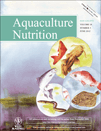
AQUACULTURE NUTRITION
Scope & Guideline
Nurturing knowledge for healthier aquatic ecosystems.
Introduction
Aims and Scopes
- Nutritional Physiology:
Research investigating the physiological responses of aquatic species to various dietary components, including the impact of amino acids, lipids, carbohydrates, vitamins, and minerals on growth and metabolic processes. - Feed Formulation and Ingredients:
Studies focusing on the efficacy of alternative feed ingredients, such as plant proteins, insect meals, and by-products, as replacements for traditional fishmeal and fish oil, aimed at enhancing sustainability in aquafeeds. - Health and Immunology:
Exploration of how dietary supplements, probiotics, and functional ingredients affect the immune response, disease resistance, and overall health of aquaculture species. - Environmental Interactions:
Research examining the influence of dietary practices on the environmental footprint of aquaculture, including nutrient utilization and waste management strategies. - Growth Performance and Quality:
Investigations into how different dietary regimes affect growth rates, feed efficiency, and the quality of aquatic products, including flesh quality and nutritional value.
Trending and Emerging
- Sustainable Feed Ingredients:
There is a notable increase in research on sustainable and alternative feed ingredients, such as insect meals, algae, and by-products from agriculture, reflecting a shift towards environmentally friendly aquaculture practices. - Functional Ingredients and Health Supplements:
Research exploring the role of functional ingredients like probiotics, prebiotics, and phytochemicals in enhancing fish health, immunity, and growth performance is trending, highlighting a holistic approach to aquaculture nutrition. - Nutrigenomics and Molecular Biology:
An emerging focus on nutrigenomics, which studies the interaction between nutrition and gene expression, is becoming more prominent, providing insights into how dietary components can optimize health and growth at the molecular level. - Microbiome Research:
The role of the gut microbiome in aquaculture nutrition is gaining attention, with studies investigating how dietary interventions can modulate microbial communities to improve health and nutrient utilization. - Climate Change Adaptation:
Emerging research is increasingly addressing how climate change affects aquaculture practices, including the nutritional requirements of species in varying environmental conditions, emphasizing the need for adaptive feeding strategies.
Declining or Waning
- Traditional Fishmeal Dependency:
Research on the use of traditional fishmeal has decreased as the industry moves towards more sustainable practices, focusing on alternative protein sources such as insects and plant-based meals. - Single Nutrient Studies:
There is a waning trend in studies focusing solely on single nutrient effects (e.g., only protein or only lipid), as integrated approaches considering multiple dietary components and their interactions are becoming more prevalent. - Aquaculture Systems Comparisons:
Comparative studies of different aquaculture systems (e.g., recirculating aquaculture systems vs. pond culture) have seen reduced frequency, as research is increasingly focused on optimizing specific systems rather than broad comparisons. - Basic Nutritional Requirements:
Basic studies detailing the nutritional requirements of specific species have declined, with more emphasis on practical applications and complex dietary formulations that consider multiple factors. - Overreliance on Conventional Ingredients:
Research involving the use of conventional aquafeed ingredients has decreased as there is a growing interest in innovative and sustainable alternatives.
Similar Journals
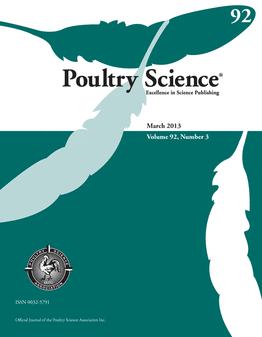
POULTRY SCIENCE
Elevating standards in avian biology and management.POULTRY SCIENCE is a premier, peer-reviewed journal published by ELSEVIER, dedicated to advancing the field of avian biology and poultry production, encompassing a wide array of topics from genetics and physiology to nutrition and management practices. With an impressive impact factor and inclusion in the Q1 quartile for both Animal Science and Zoology as well as Miscellaneous Medicine, this journal is recognized as a leading source of high-quality research among its peers, ranking 17th out of 490 in its category. Since transitioning to Open Access in 2020, the journal has expanded its reach, allowing global accessibility to its significant findings, which are crucial for researchers, industry professionals, and students alike. The journal’s continuous publication from 1965 to 2024 underscores its long-standing commitment to fostering innovation in poultry science, making it an invaluable resource for anyone involved in the progression of this vital sector.
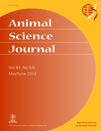
ANIMAL SCIENCE JOURNAL
Uncovering Insights for a Sustainable Future in Animal SciencesAnimal Science Journal, published by Wiley, stands as a premier platform for advancing knowledge in the fields of Agricultural and Biological Sciences, Animal Science and Zoology, and Food Science. With an ISSN of 1344-3941 and an E-ISSN of 1740-0929, this journal not only enjoys a commendable Q2 ranking across multiple categories, reflecting its significance and impact within the academic community, but it also ranks within the top percentiles in terms of Scopus rankings. Operating out of the United Kingdom, the journal covers a broad spectrum of research topics relevant to animal science, encompassing both theoretical insights and practical applications. While it is not an open access journal, it remains an essential resource for researchers and practitioners eager to enhance their understanding of animal sciences, contribute to ongoing debates, and stay abreast of the latest findings from 2003 through 2024. Scholar engagement and innovative research are central to the journal’s objectives, making it an invaluable asset for students, professionals, and academics alike.
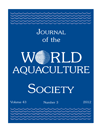
JOURNAL OF THE WORLD AQUACULTURE SOCIETY
Championing Sustainable Practices in Aquatic SciencesThe JOURNAL OF THE WORLD AQUACULTURE SOCIETY, published by WILEY, serves as a premier platform for researchers, practitioners, and academics in the thriving fields of aquaculture and aquatic sciences. With an ISSN of 0893-8849 and an E-ISSN of 1749-7345, this esteemed journal boasts an impressive ranking in Scopus, placing it in the Q1 quartile for both Agronomy and Crop Science and Aquatic Science. Recognized for its rigorous peer-review process and high-quality publications since its inception in 1986, the journal continues to play a vital role in disseminating cutting-edge research that addresses the complex challenges and opportunities within aquaculture practices globally. The journal's impact is underscored by its rank of #37 out of 247 within the category of Aquatic Science and #70 out of 406 in Agronomy in 2023, positioning it firmly in the top tier of scholarly journals. Researchers and professionals will find an invaluable resource in this journal, which not only aims to advance scientific knowledge but also fosters a community committed to sustainable aquatic development.
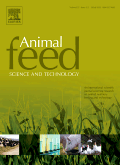
ANIMAL FEED SCIENCE AND TECHNOLOGY
Shaping the Future of Animal Nutrition and WelfareANIMAL FEED SCIENCE AND TECHNOLOGY, published by Elsevier, is a leading journal in the field of Animal Science and Zoology, with an impressive Q1 quartile ranking and a 93rd percentile standing among its peers. Since its inception in 1976, this journal has been at the forefront of disseminating significant research in animal feed formulation, nutritional efficiency, and the technological advancements influencing feed science. With a reputation for high-impact studies, it serves as an essential resource for researchers, professionals, and students dedicated to the optimization of animal nutrition and welfare. The journal's comprehensive coverage of innovative methodologies and findings continues to shape practices in agricultural and biological sciences. For those keen to keep abreast of pivotal developments in the field, ANIMAL FEED SCIENCE AND TECHNOLOGY remains a crucial outlet for scholarly contributions and discussions.

Turkish Journal of Fisheries and Aquatic Sciences
Enhancing biodiversity through impactful aquatic studies.Turkish Journal of Fisheries and Aquatic Sciences, published by the CENTRAL FISHERIES RESEARCH INST, is a key resource in the fields of Fisheries and Aquatic Sciences, catering to a global community of researchers and professionals. With its ISSN 1303-2712 and E-ISSN 2149-181X, this journal offers an engaging platform for the dissemination of high-quality research from Turkey, covering critical topics within Animal Science and Aquatic Science. As a third quartile journal in both categories (Q3, 2023), it provides valuable insights, contributing to a growing body of literature that addresses aquatic ecosystems, fisheries management, and biodiversity conservation, thereby enhancing the sustainability of aquatic resources. The journal has shown considerable impact, ranking 144th in Animal Science & Zoology and 116th in Aquatic Science within Scopus, reflecting its relevance and credibility within the academic community. Operating from 2008 to 2024, it invites open access submissions to foster collaboration and knowledge sharing among scientists, students, and practitioners alike, reinforcing its dedication to advancing the science of aquatic ecosystems.
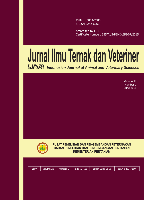
Jurnal Ilmu Ternak dan Veteriner
Empowering researchers with cutting-edge veterinary insights.Jurnal Ilmu Ternak dan Veteriner, published by Pusat Penelitian dan Pengembangan Peternakan, is a leading Open Access journal based in Indonesia that has been providing a platform for groundbreaking research in the fields of animal science and veterinary medicine since its establishment. With its ISSN (0853-7380) and E-ISSN (2252-696X), this journal aims to disseminate high-quality research that addresses critical challenges and innovations in animal husbandry, veterinary practices, and related biological sciences. Recognized within the Q4 category in Animal Science and Zoology and the Q3 category in Veterinary (miscellaneous) as of 2023, it serves as an essential resource for researchers and practitioners looking to stay current with the advancements in these vital fields. The journal's commitment to providing Open Access content since 2011 ensures that cutting-edge findings are readily available to a global audience, fostering collaboration and progress in the animal sciences. With the Scopus ranking reflecting its niche position in the veterinary and agricultural sciences, Jurnal Ilmu Ternak dan Veteriner is poised to make a significant impact through 2024 and beyond.

Revista MVZ Cordoba
Advancing knowledge in Animal Science and Veterinary Medicine.Revista MVZ Cordoba, an esteemed publication of UNIV CORDOBA, is a pivotal resource for researchers and practitioners in the fields of Animal Science, Zoology, and Veterinary Medicine. Established as an Open Access journal since 2000, it facilitates widespread accessibility of scholarly articles from Colombia, fostering global collaboration and knowledge dissemination. The journal has demonstrated its commitment to quality, holding Q4 quartile rankings in 2023 across various categories including Animal Science and Zoology, and Aquatic Science. Despite its current challenges in rankings, with percentiles in the lower brackets, it represents an important platform for the advancements in these disciplines, specifically catering to emerging research and insights. The journal's annual publication cycle from 2008 to 2024 ensures that it remains timely and relevant in covering contemporary issues within veterinary science and related areas. For researchers, professionals, and students, Revista MVZ Cordoba stands out as a valuable avenue for the exploration of veterinary sciences within a diverse academic landscape.
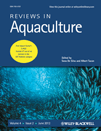
Reviews in Aquaculture
Empowering Aquaculture Through Cutting-Edge ResearchReviews in Aquaculture, published by Wiley, stands as a premier journal in the field of aquaculture and environmental science, dedicated to advancing knowledge and research on aquatic species and their management. Since its inception in 2009, the journal has built a robust reputation, achieving a remarkable Q1 ranking in prestigious categories including Aquatic Science, Ecology, and Management, Monitoring, Policy, and Law as of 2023. With a focus on delivering high-quality, peer-reviewed articles, it plays a critical role in disseminating innovative research and practical solutions to global challenges in aquaculture. Researchers, professionals, and students can navigate through the latest advancements in the field, gaining insights that are vital for sustainable practices and policy-making. The journal's impact is further highlighted by its exceptional Scopus rankings, placing it in the top percentile across various environmental and agricultural disciplines, making it an essential resource for those seeking to stay at the forefront of aquaculture research.
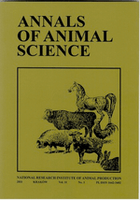
Annals of Animal Science
Connecting Professionals Through Open Access KnowledgeAnnals of Animal Science is a prestigious academic journal, published by Walter de Gruyter GmbH in Germany, specializing in the multifaceted field of Animal Science. With an ISSN of 1642-3402 and an E-ISSN of 2300-8733, this journal is recognized for its high-impact contributions, holding a commendable impact factor that demonstrates its relevance in nurturing quality research. The journal has garnered Q2 rankings in 2023 across various categories including Animal Science and Zoology, Food Animals, and Small Animals. Notably, its Scopus Rankings indicate an elite standing, with the journal placing in the top 10% within its specific fields. Covering converged years from 2008 to 2024, the Annals of Animal Science serves as an essential platform for researchers, professionals, and students to disseminate knowledge and advance studies related to animal health, welfare, and production. The journal also emphasizes open access, promoting broader accessibility to foster collaboration and innovation in Animal Science globally. For those committed to advancing their understanding of veterinary and agricultural sciences, this journal is a vital resource.

CZECH JOURNAL OF ANIMAL SCIENCE
Elevating Standards in Animal Science ScholarshipThe Czech Journal of Animal Science, published by the Czech Academy Agricultural Sciences, is a premier open-access journal dedicated to advancing research in the fields of animal science and zoology. With an impressive ranking of Q2 in its category for 2023, it underscores its significance within the academic community, evidenced by its Scopus rank of #197 out of 490 in Animal Science and Zoology, placing it in the 59th percentile among peers. The journal has been a crucial platform for scholarly communication since its inception and has embraced open access since 2004, ensuring that research is widely available to a global audience. Targeted toward researchers, professionals, and students, the journal publishes high-quality original research, review articles, and case studies that contribute to the understanding and enhancement of animal science practices. Its commitment to rigorous peer review and its broad scope undoubtedly solidify its role as an essential resource for those engaged in animal research and agriculture, fostering continued innovation and knowledge transfer in this vital sector.